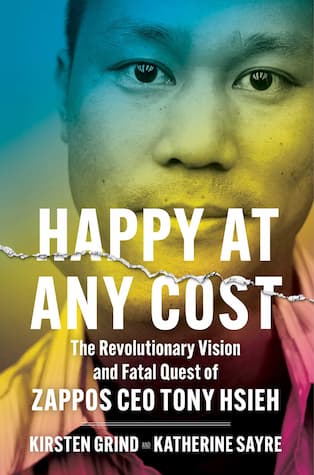Happy at Any Cost: The Revolutionary Vision and Fatal Quest of Zappos CEO Tony Hsieh by Kirsten Grind, Katherine Sayre
Published by Simon & Schuster
Publication date: March 15, 2022
Genres: Book Clubs, Non-fiction, Biography

Bookshop, Amazon
While Zappos may be an easily recognizable name to anyone who shops online and loves shoes, Tony Hsieh is probably not. I knew of him because he was often profiled in business news for his unique take on the best way to run a successful company. Happiness. Zappos was consistently ranked in the top 10 of best companies to work for by numerous magazines—Forbes, Fast Company, Fortune, Wired—in the years Hsieh ran it. How then did its founder, a man who believed personal happiness was the critical ingredient for success go so completely off the rails that he died in 2020 at age 46? Journalist Kirsten Grind attempts to answer that question in Happy at Any Cost, a fascinating and tragic biography of Hsieh’s life.
Hsieh’s parents were successful professionals and expectations with the family were high for all the children. Not just for school, but extracurriculars as well. Hsieh participated in sports as well as playing three instruments—practicing each for 30 minutes a day and an hour each on weekends. In middle school. I write this with the stunned face of someone who couldn’t manage the clarinet for 6 months.
The drive to excel continued into college with Hsieh graduating from Harvard in 1995 with a degree in computer science and within three years founding and selling ad linking software for online businesses. To Microsoft for $265 million dollars, of which Hsieh took home $32 million. At the age of 25 he could do whatever he wanted with the rest of his life.
It was at this time that Hseih began thinking about the workplace experience he’d like; the kind of environment he wanted to foster. When the opportunity came around to start one of the first online retailers he jumped and Zappos came into being, despite the many predictors saying people (mostly women) would never buy shoes online. Oops.
Zappos became the platform for Hseih’s belief that work could be fun. For over a decade the core principles he designed for Zappos exceeded to an extraordinary degree. Later, after Zappos achieved success in every metric possible, he went on to use his money for philanthropic ventures, like spending $350 million of his own money to revitalize downtown Las Vegas, where he had moved Zappos headquarters in 2004. He gave money to friends and organizations so they could achieve their dreams.
The belief in happiness as life’s greatest goal may have driven Hseih in his endeavors, but Happy at Any Cost reveals the underlying issues that made it a mirage. He was a shy extrovert, seemingly a contradiction, but what he wanted was a tribe, to be part of a collective community. Not to stand in front or stand out, both made him incredibly uncomfortable. And yet, he could not be alone, a state he found “repulsive”. The combination meant he was working against his own nature, using alcohol and drugs as his main tools. He wanted to alter his mind and expand it, so ecstasy, mushrooms, and later ketamine and nitrous oxide in copious amounts were the options he sought rather than any professional help.
This is a powerful, propulsive story, carefully balancing Hsieh’s personal and professional life and bringing to light his mental health issues. He had everything anyone could want, but no peace of mind. Happy at Any Cost shows Tony Hseih’s life to be a marvel of kindness, generosity, and enthusiasm that spiraled into a tragic cautionary tale.
This post contains affiliate links which means if you click on a link and make a purchase of any kind, I get a small commission (at no cost to you).
*I received a free copy of this book from Simon & Schuster in exchange for an honest review.*


















Wow, sounds stunning. What an important cautionary tale for our times, and how sad that Hsien could not come back from the brink of this tragedy. With the material success that so many dream of not being enough to save his life, it makes one think about what is really important.
He strived to help so many but was never able to help himself.
I enjoy learning about diverse books via your reviews. This book sounds like a cautionary tale that money without the right values, and relationships in your life does not buy happiness. Also sounds like the young man had mental health issues that went untreated, so sad.
Absolutely. He had an amazing heart and his business model is one that should be used more often, but his own mental health was something he refused to deal with.